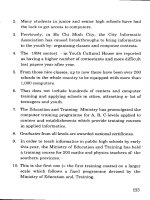Tiếng Anh Cho Người Đi Làm - Tiếng Anh Giao Tiếp Cho Người Đi Làm - Business English - No 1
Bạn đang xem bản rút gọn của tài liệu. Xem và tải ngay bản đầy đủ của tài liệu tại đây (578.96 KB, 20 trang )
Engl_CD_Booklet_1_1010
16.09.2005
9:25 Uhr
Seite 1
Business
Talk
Business Englisch
Trainer No. 1
Die wichtigsten Redewendungen für Geschäftstreffen und Small Talk.
Engl_CD_Booklet_1_1010
16.09.2005
9:25 Uhr
Seite 2
Engl_CD_Booklet_1_1010
16.09.2005
9:25 Uhr
Seite 3
Business Talk No. 1
MEETINGS
1. Introduction
SOCIALIZING
1:19
Arranging a meeting
2. Dialogue: fixing a date
3. Exercises: key phrases
Dialogue: getting started
Exercises: key opening phrases
Dialogue: managing conflict
Exercises: keeping control
Example: closing a meeting
Exercise: using closing phrases
1:57
2:51
1:23
3:10
1:04
2:02
Interrupting in meetings
10.
11.
12.
13.
Dialogue: getting your views across
Exercise: the INSET method
Dialogue: using INSET
Exercises: key phrases using INSET
0:39
Greetings
1:54
3:10
Chairing a meeting
4.
5.
6.
7.
8.
9.
14. Introduction
2:29
3:39
0:34
2:44
15.
16.
17.
18.
Dialogues: ways to greet and respond
Exercise: replying to greetings
Examples: introducing yourself
Dialogues: greetings and introductions
2:06
0:53
2:35
1:58
Small talk
19. Dialogue: using small talk
20. Exercises: small talk techniques
2:26
6:35
Socializing with visitors
21. Dialogues: welcoming visitors
22. Exercise: using the six steps
4:07
4:50
23. Conclusion
0:41
Total playing time:
55:06
3
Engl_CD_Booklet_1_1010
16.09.2005
MEETINGS
A
AR
RR
RA
AN
NG
G II N
NG
G A
A M
ME
EE
ET
T II N
NG
G
2. Dialogue: fixing a date
Jane: Sandra, do you have a minute?
Sandra: Sure, what’s up?
Jane: Oh, I’m just trying to organize a team meeting for next week, and I’m having no success yet
fixing a date.
Sandra: I thought you’d decided on Thursday.
Jane: I had, but Joe can’t make it then.1 So he
was wondering about Friday.
Sandra: Oh, Friday’s not at all convenient for me,
I’m afraid.2 I’ll be in London.
Jane: Oh, yes. I forgot. Well, let me see.
Monday’s not good for Jane, and Harry’s not
available for most of Tuesday.3 That leaves
Wednesday, basically.
Sandra: I think Wednesday suits me just fine4 —
oh, hold on. Didn’t Pete say he’d be in town on
Wednesday morning? If he is, I’ll need to meet
with him.
Jane: Oh, I forgot. That’s true. Last I heard, he
didn’t think he was going to come after all, but
4
9:25 Uhr
Seite 4
I’ll check on that. OK, let’s pencil in Wednesday
morning, 10 o’clock, and I’ll call you to confirm
when I’ve checked with Pete.
Sandra: Sounds good.
Jane: And if all else fails, we’ll have to postpone
the meeting until the following week.
Sandra: That’s fine, too. I’m free that whole week.5
3. Exercises: key phrases
a. Listen to key phrases from the dialogue “fixing a
date”. Refer to notes 1–5.
b. Create a sentence using the phrase given.
■ How about Wednesday? (No/convenient)
➔ I’m afraid Wednesday’s not convenient for me.
check on sth.
confirm sth.
convenient
fix a date
hold on
if all else fails
make it
pencil sth. in
postpone sth.
suit sb. (just) fine
what’s up?
etw. überprüfen
etw. bestätigen
passend
einen Termin festlegen
warte mal
wenn alle Stricke reißen
es schaffen
etw. vorläufig festhalten
etw. verschieben
jmdm. gut passen
was gibt’s?
Engl_CD_Booklet_1_1010
16.09.2005
■ How about Thursday? (No/make it)
➔ I’m afraid I can’t make it on Thursday.
■ How about Friday? (No/available)
➔ I’m afraid I won’t be available on Friday.
■ How about Tuesday? (Yes/suits)
➔ Tuesday suits me fine.
C
CH
HA
A II R
R II N
NG
G
A
A
M
ME
EE
ET
T II N
NG
G
9:25 Uhr
Seite 5
Carol: Well let’s get on with it. I’m very pressed
for time. Where’s the agenda?
Chair: I thought we could do that together.
Michael: Oh, God!
Carol: Well, I want to talk about the training
budget for next year. It doesn’t cover the customer care seminars we’d planned.
Michael: That’s right. We need at least another
€10,000, because...
4. Dialogue: getting started
5. Exercises: key opening phrases
Chair: Hello, everyone...
Carol: So I said, “It’s not good enough. We need
two more salespeople to cover the area properly.” And do you know what he said?
Michael: No, but I can imagine.
Chair: Right, so if we’re all here…?
Carol: “No chance!” That’s what he said. And I’m
really struggling to cover customers properly,
and working a 60-hour workweek.
Chair: OK? Can we...?
Michael: It’s the same for me. I was only talking
to Harry last week, ...
Chair: Sorry. Sorry. Can we...?
Michael: Oh, right. Have we started?
Chair: Yes. I suppose so.
a. Repeat the following key phrases.
Getting started:
■ Right. Shall we get down to business?
■ OK. Shall we start?
■ I’d like to call the meeting to order.
agenda
call the meeting to order
chair
customer care
get down to business
get on with sth.
pressed: be ~ for
time
salespeople
Tagesordnung
die Versammlung zur
Ordnung rufen
Vorsitzende(r)
Kundenbetreuung
zur Sache kommen
mit etw. weiterkommen
unter Zeitdruck
stehen
Vertriebsleute
5
Engl_CD_Booklet_1_1010
16.09.2005
Introducing the agenda:
■ Does everyone have a copy of the agenda?
■ Has everyone seen the agenda?
■ There are five points to be covered on our
agenda today.
Introducing discussion points:
■ Item one: training budget for next year.
■ The first item on the agenda is the training
budget for next year.
■ The first item we should discuss is the train-
ing budget for next year.
b. Use key phrases to open the meeting.
➔ Right. Shall we get down to business?
➔ Does everyone have a copy of the agenda?
➔ The first item is the training budget for next
year.
9:25 Uhr
Seite 6
about the customer care training that we were
all so keen on before.
Anne: Yes, but the financial situation is not as
good as it was then. We need to be a little more
careful with our costs.
Carol: Typical finance! You seem to think that it’s
all to do with figures. It’s people that count.
Anne: Look, if you in sales were more responsible about your expenses and thought a bit more
about the good of the company rather than the
good lunches...
Carol: And what’s that supposed to mean? Look,
I work 60 hours a week and don’t you forget it. I
don’t go home at 5.30 like some people I know.
Chair: Wait a moment. Shouldn’t we....
Anne: That’s totally unfair! I’ve not come to this
meeting to be personally insulted.
Carol: Well, you asked for it.
Chair: Please. Please...
6. Dialogue: managing conflict
Chair: The first item on the agenda is the training
budget for next year. The proposed figures are
attached to the agenda. Can we agree on this
proposal?
Carol: Absolutely not! There’s nothing in here
6
attached
expenses
figure
good
insult sb.
item
keen: be ~ on sth.
you asked for it ifml.
angehängt
Kosten
Zahl
Wohl
jmdn. beleidigen
(Tagesordnungs)Punkt
auf etw. scharf sein
du hast es ja so gewollt
Engl_CD_Booklet_1_1010
16.09.2005
9:25 Uhr
Seite 7
7. Exercises: keeping control
8. Example: closing a meeting
a. Repeat the following key phrases.
Chair: Right, ladies and gentlemen, that was the
last item on the agenda. Before I close the meeting, is there any other business? No? Good.
Well, let me summarize. We’ve agreed a new
training budget, got information about two new
product ranges, agreed on a new process for
evaluating customer satisfaction and, finally,
planned our next sales conference. We should
be pleased about how much we were able to
cover this afternoon. Thank you all for your
inputs. We’ll see each other the same time and
place next week. OK. The meeting’s closed.
■ Sorry to interrupt, but can we discuss this
reasonably, please?
■ I’m afraid I shall have to call you to order.
■ Order, please! Let’s have a civilized discus-
sion here.
■ Could you address your remarks to the chair,
please?
b. Use the instructions given to keep control.
■ Introduce item one.
➔ The first item on the agenda is the training
■
➔
■
➔
■
➔
budget for next year. The proposed figures
are attached to the agenda. Can we agree on
this proposal?
Ask them to be reasonable.
Sorry to interrupt, but can we discuss this
reasonably, please?
Call her to order.
I’m afraid I shall have to call you to order.
Now ask for a civilized discussion.
Order, please. Let’s have a civilized discussion here.
address sth. to sb.
evaluate sth.
input
product range
summarize
etw. an jmdn. richten
etw. auswerten
Beitrag
Produktlinie
eine kurze Zusammenfassung geben
7
Engl_CD_Booklet_1_1010
16.09.2005
9. Exercise: using closing phrases
Repeat the following.
■ Right, ladies and gentlemen, that was the last
item on the agenda.
■ Before I close the meeting, is there any other
business?
■ Well, let me summarize...
■ We should be pleased about how much we
were able to cover.
■ Thank you all for your inputs.
■ We’ll see each other the same time and place
next week.
■ OK. The meeting’s closed.
II N
NT
TE
ER
RR
RU
UP
PT
T II N
NG
G
II N
N M
ME
EE
ET
T II N
NG
GS
S
9:25 Uhr
Seite 8
John: Look, sorry for interrupting, Brian, but —
how can I put this? — it doesn’t seem very logical to go from Frankfurt to Munich and then back
to Hanover, does it?
Marion: I think John’s right. Couldn’t we...
Brian: Sorry, but it’s already arranged. The invitations have been printed and...
John: But hang on a second — who decided to
do that? Wasn’t this meeting supposed to be all
about confirming arrangements?
Marion: Yes. I thought...
Brian: Look, time was getting short, so I had to
make a quick decision. I was under pressure
from the printers.
Marion: But I don’t think this is right. I think...
Brian: Look, what’s done is done. Sorry and all
that. But let’s get on with a content discussion
now, shall we?
10. Dialogue: getting your views across
Brian: Right, let’s go on to the arrangements for
the road show next month. I understand there
will be six of us all together and...
John: Seven, Brian, if you count Sam the technician.
Brian: Right. And the itinerary is decided and
everybody knows what...
8
confirm sth.
content
hang on a second
itinerary
put sth.
road show
technician
etw. bestätigen
Inhalt; hier: inhaltlich
Augenblick mal
Reiseroute
etw. formulieren
Verkaufstournee
Techniker(in)
Engl_CD_Booklet_1_1010
16.09.2005
Marion: But I do think...
John: You’re right. It’s no use crying over spilt
9:25 Uhr
Seite 9
■ It seems to me that...
■ Why don’t we...?
milk.
Brian: Good. So let’s look at the programme
T: Test agreement
details and see if we can...
■ Does this make sense to you?
■ Wouldn’t you agree?
■ Can we agree on this?
11. Exercise: the INSET method
Repeat the following phrases.
12. Dialogue: using INSET
I: Interrupt clearly
■ Excuse me, but...
■ Can I just say something here?
■ Forgive my interrupting, but...
N: Need to think
■ So what is the question here?
■ How shall I put this?
■ Now, let me get this straight.
S: Show what the issue is
Brian: Look, time was getting short, so I had to
make a quick decision. I was under pressure
from the printers.
Marion: Can I just say something here? Now how
shall I put this? This is a question of keeping your
colleagues informed. I think you should have
called or e-mailed us and got our opinions.
Wouldn’t you agree?
John: Well, I agree with Marion. You should have
informed us and...
■ The problem we have to deal with is...
■ This is a question of...
■ I think the issue here is...
E: Explain your proposal
■ I think we should...
issue
it’s no use crying over
spilt milk
let me get this straight
(Kern)Frage
was geschehen ist,
ist geschehen
nur, um das klarzustellen
9
Engl_CD_Booklet_1_1010
16.09.2005
13. Exercises: key phrases using INSET
a. Listen to key phrases from the dialogue “using
INSET”.
I: Can I just say something here?
N: Now how shall I put this?
S: This is a question of keeping your colleagues
informed.
E: I think you should have called or e-mailed us
and got our opinions.
T: Wouldn’t you agree?
b. Use the instructions given to make a suggestion. You
would like the meeting to take place on Wednesday
because you’re busy on Friday.
Speaker 1: So I suggest Friday next week for our
follow-up meeting.
Speaker 2: Yes, that’s fine by me. So what time do
you suggest?
■ Now you interrupt.
➔ Can I just say something here?
■ Give yourself time to think by using a holding
phrase.
➔ Now, let me get this straight.
■ Show what the issue is.
➔ It’s a question of finding a day when everyone’s available.
10
9:25 Uhr
Seite 10
■ Explain your proposal.
➔ I’m busy on Friday, so I suggest the following
Wednesday when I know we’re all free.
■ Test agreement.
➔ Can we agree on that?
Engl_CD_Booklet_1_1010
16.09.2005
SOCIALIZING
G
GR
RE
EE
ET
T II N
NG
GS
S
15. Dialogues: ways to greet and respond
Greeting 1: How do you do?
Response 1: How do you do?
Greeting 2: Nice to meet you.
Response 2: Nice to meet you, too.
9:25 Uhr
Seite 11
■ Nice to meet you.
■ Hi there!
17. Examples: introducing yourself
■ Nice to meet you. My name is Michael Thon.
■ My name is Bond. James Bond.
■ Hello. I’m James, James Bond.
18. Dialogues: greetings and introductions
John Mason: Good morning. My name is John,
Greeting 3: How are you?
Response 3: Fine, thanks. And you?
Reply 3: Fine, thanks.
John Mason from Abacom.
George West: Nice to meet you, John. I’m George
West from ATG.
John: Nice to meet you, George.
Greeting 4: Hi there!
Response 4: Hi!
16. Exercise: replying to greetings
Henry Matthews: How do you do? I’m Henry
Matthews, head of finance.
Helen Wolf: How do you do, Mr Matthews? I’m
Helen Wolf from ETS.
Matthews: Nice to meet you, Ms Wolf.
Respond with the same level of formality.
■ How are you?
■ How do you do?
head of finance
Finanzleiter(in)
11
Engl_CD_Booklet_1_1010
16.09.2005
Mike: John! How are you?
John: Fine, thanks, Mike. And how are you?
Mike: Great.
John: Mike, this is one of my colleagues, Roberta
Jones.
Mike: Nice to meet you, Ms Jones.
Roberta Jones: Nice to meet you too. And please
call me Roberta.
Mike: And I’m Mike.
S
SM
MA
AL
LL
L
T
TA
AL
LK
K
19. Dialogue: using small talk
Nick: Nick Johnson. Good morning.
Pauline: Hello, Nick. It’s Pauline Matthews here.
Nick: Hello, Pauline.
Pauline: I wasn’t sure if you were back from
your holidays this week — the south of France,
wasn’t it?1a
Nick: Yes, we were in a place called Collioure.
Do you know it?
Pauline: No. Not really.
Nick: It’s a lovely small harbour town filled with
artists and galleries. I even bought two paintings.
Pauline: Funny you should say that, but we were
12
9:25 Uhr
Seite 12
in Cornwall a couple of weeks ago, in St Ives,
and it’s the same. But we didn’t buy anything.
Just looked. And went to the small Tate Gallery
there.2 Anyway, the reason I’m calling is to ask
about last month’s sales figures. Are they available yet?b
Nick: Not completely. Is it urgent?
Pauline: It is, rather. John’s on my back to get the
quarterly report done by Friday.
Nick: Give me a couple of hours and I’ll see what
I can do. Shall I mail them when they’re ready?
Pauline: Please. I’d be really grateful. Although
our computers might be down for a while this
afternoon. We’re having an upgrade done. You
can probably hear the IT people chattering in the
background.3
Nick: Good luck! These things usually take a lot
longer than they say they will.
back: be on sb.’s ~
chatter
down: be ~
gallery
IT people
quarterly report
rather
sales figures
upgrade: do an ~
urgent
jmdm. im Nacken sitzen
sich unterhalten
außer Betrieb sein
Kunstgalerie
EDV-Leute
Quartalsbericht
ziemlich
Umsatzzahlen
hier: neue Softwareversionen installieren
dringend
Engl_CD_Booklet_1_1010
16.09.2005
Pauline: That’s right. By the way, have you heard
anything from Ali about how his new job is going
in Planning?4c
Nick: Haven’t heard a word. I must give him a
call.
Pauline: Well, give him my best. So, I’ll expect a
mail from you this afternoon — and I’ll keep my
fingers crossed our system is up and running
when you send it.
Nick: OK. Nice talking to you, Pauline. Bye.
Pauline: Bye, Nick.
20. Exercises: small talk techniques
a. Listen to key phrases for making small talk from the
dialogue “using small talk”. Refer to notes 1–4.
9:25 Uhr
Seite 13
■ Say you weren’t sure if she was going to be
there.
➔ I wasn’t sure if you were going to be there.
You had said something about taking some
time off work.
Rebecca: Oh. No, that’s next week. I can’t wait!
I’m going to spend three days on my balcony,
reading that nature book you lent me.
Pauline: I think you’ll enjoy it, Rebecca. It’s a very
good read.
■ Ask for the contract she typed up.
➔ Anyway, the reason I’m calling is that I need
that contract you typed up.
Rebecca: I’ll put the contract in the mail tomorrow.
Pauline: Thanks, Rebecca. I appreciate it.
■ Ask about Rebecca’s brother,
➔ By the way, have you heard from your brother lately?
b. Listen to key phrases for switching topics from the
dialogue “using small talk”. Refer to notes a–c.
c. Use the instructions given to switch topics in the following conversation.
Rebecca: Trial Systems, Rebecca Sheldon speaking.
Pauline: Hello, Rebecca. This is Pauline.
Rebecca: Hello, Pauline.
give him my best
I appreciate it
keep one’s fingers
crossed
read
type sth. up
up and running: be ~~~
grüß ihn von mir
das finde ich wirklich nett
die Daumen drücken
Lektüre
etw. komplett abtippen;
hier: maschinell erstellen
(wieder) laufen
13
Engl_CD_Booklet_1_1010
16.09.2005
S
SO
OC
C II A
AL
L II Z
Z II N
NG
G W
W II T
TH
H
V
V II S
S II T
TO
OR
RS
S
21. Dialogues: welcoming visitors
Step one: greeting visitors
Host: Come in.
Visitor: Hello.
Host: Mr Matthews? Nice to meet you. I’m
9:25 Uhr
Seite 14
Visitor: Right in the centre of town, at the
Sheraton.
Step four: asking about travel experience, offering
help
Host: Is this your first time here?
Visitor: Yes it is, actually.
Host: If you have time, I could show you around
the city a little after our meeting.
Visitor: Oh, that would be nice!
Heather Miller. Welcome to Artan.
Visitor: Thank you. Nice to meet you too.
Step five: discussing general business
Step two: making visitors feel comfortable
Host: So how’s business going?
Visitor: We can’t complain. But the strength of
Host: May I take your coat?
Visitor: Oh yes, thank you.
Host: Please take a seat. Would you like some
tea or coffee?
Visitor: I’d love a glass of water if I may.
Host: Certainly.
the pound has hit us a bit.
Host: John Myers, your local sales rep, was saying the same thing last month.
Visitor: Oh, John. Yes, right. John and I worked
together in purchasing for a couple of years.
Nice guy.
Host: Yes, he is.
Step three: asking about travel and hotel
Host: How was the flight?
Visitor: Oh there were the usual hold-ups at Heathrow, but I was only 45 minutes late in the end.
Host: Oh, dear. But it could have been worse, I
suppose. Where are you staying?
14
guy
hold-up
host
if I may
oh, dear
purchasing
sales rep(resentative)
Typ
Verzưgerung
Gastgeber(in)
bitte
oje
Einkauf(sabteilung)
Aendienstmitarbeiter(in)
Engl_CD_Booklet_1_1010
16.09.2005
Step six: getting down to business
Host: OK. Shall we get started, then? We’ve got
quite a lot to get through this afternoon. Then
perhaps we could have a look around town and
have a bite to eat together.
Visitor: Sounds good to me. Shall we agree on
the agenda and then get going?
9:25 Uhr
Seite 15
➔ Please take a seat. Would you like some tea
or coffee?
Visitor: I’d love a glass of water if I may.
Step three: asking about travel and hotel
■ Ask Mr Matthews about his flight.
➔ How was the flight?
Visitor: Oh there were the usual hold-ups at
22. Exercise: using the six steps
Use the instructions given to welcome visitors.
Step one: greeting visitors
■ Say hello to your visitor, Mr Matthews, and
welcome him. Use you own name and your
company’s name.
➔ Mr Matthews? Nice to meet you. I’m Heather
Miller. Welcome to Artan.
Visitor: Thank you. Nice to meet you too.
Heathrow, but I was only 45 minutes late in the
end.
■ Show empathy and ask Mr Matthews where
he’s staying.
➔ Oh, dear. But it could have been worse, I suppose. Where are you staying?
Visitor: Right in the centre of town, at the
Sheraton.
Step two: making visitors feel comfortable
■ Make your visitor feel comfortable by offering
to take his coat.
➔ May I take your coat?
Visitor: Oh yes, thank you.
■ Invite Mr Matthews to sit down, and offer him
refreshments.
agenda
bite to eat ifml.
empathy
get going
get started
refreshments
Tagesordnung
kleiner Imbiss
Mitgefühl
loslegen
anfangen
Getränke
15
Engl_CD_Booklet_1_1010
16.09.2005
9:25 Uhr
Seite 16
Step four: asking about travel experience, offering
help
■ Offer to look around town afterwards and get
■ Ask Mr Matthews if he has been here before.
➔ Is this your first time here?
➔ Then perhaps we could have a look around
Visitor: Yes it is, actually.
Visitor: Sounds good to me. Shall we agree on
■ Offer to act as a guide.
➔ If you have time, I could show you around the
the agenda and then get going?
city a little after our meeting.
Visitor: Oh, that would be nice!
Step five: discussing general business
■ Ask a general question about business.
➔ So how’s business going?
Visitor: We can’t complain. But the strength of
the pound has hit us a bit.
■ Say you have heard the same thing recently
from John Myers, the local sales rep.
➔ John Myers, your local sales rep, was saying
the same thing last month.
Visitor: Oh, John. Yes, right. John and I worked in
purchasing together for a couple of years. Nice
guy.
Step six: getting down to business
■ Suggest you start the meeting.
➔ OK. Shall we get started then? We’ve got
quite a lot to get through this afternoon.
16
something to eat.
town and have a bite to eat together.
Engl_CD_Booklet_1_1010
16.09.2005
9:25 Uhr
Seite 17
IMPRESSUM
Redaktion: Dr. Ian McMaster, Kathrin Hauger, Carol Scheunemann,
Vicki Sussens-Messerer, Elena Chardakliyska
Lektorat: Elisabeth Schneider-Eicke
Produktion und Ton: Karl Braun
Tonstudio: Artist Studio, München
Übersetzungen: Ina Sinning
Gestaltung: Bettina Gorn
Chefin vom Dienst: Maja Sirola, Susanne Pfeifer (Assistenz)
Anmoderation: Erica Gingerich (US)
Moderation: Ken Taylor (UK)
Sprecher: Douglas Bolduc (US), Julie Collins (AUS), Tania Higgins (UK),
Laurie Norqust (US), Inez Sharp (UK), Eric Sumner (UK)
Spotlight Verlag GmbH, Postfach 1565, D-82144 Planegg;
Tel. (089) 8 56 81-0; Fax (089) 8 56 81-105
17
Engl_CD_Booklet_1_1010
16.09.2005
9:26 Uhr
Seite 18
12 CDs für nu
r 50,– €.
Sie sparen 15
%.
Engl_CD_Booklet_1_1010
16.09.2005
9:27 Uhr
Seite 19
Jeden Mon
at neu !
Porträts
zum Hören!
Die Handelsblatt Audio Edition im Abo.
Die Ikonen der Wirtschaft im Porträt. Spannende Geschichten von den grưßten
Persưnlichkeiten der Wirtschaft, einfühlsam, mitreißend und kenntnisreich porträtiert
von den Journalisten Deutschlands grưßter Wirtschafts- und Finanzzeitung.
Sichern Sie Ihren Vorteil und abonnieren Sie die monatlich
erscheinende Porträtreihe.
Lassen Sie sich bequem jeden Monat eine neue Audio-CD zuschicken.
Jetzt direkt bestellen im Internet unter:
www.handelsblatt-shop.com
Jede CD ist auch für 5,- € einzeln erhältlich.
Im gut sortierten Buchhandel oder direkt im Handelsblatt-Shop.
Handelsblatt-Shop Kundenservice
Telefon: 0800.000 20 56
Telefax: 0800.000 20 57
E-Mail:
Engl_CD_Booklet_1_1010
16.09.2005
9:28 Uhr
Seite 20
Weitere Ausgaben der Handelsblatt Audio Edition,
Wirtschaftsbücher und exklusive Sonderdrucke großer Serien finden
Sie im Handelsblatt-Shop unter:
www.handelsblatt-shop.com
Telefon: 0800.000 20 56
Telefax: 0800.000 20 57
Verlagsgruppe Handelsblatt GmbH - Kasernenstr. 67 - 40213 Düsseldorf









